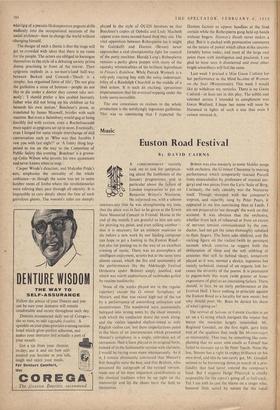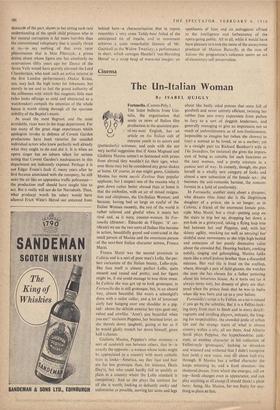Music
Euston Road Festival
By DAVID CAIRNS A CORRESPONDENT recently took me to task for complain- ing about the feebleness of the January programmes, and in particular about the failure of London impresarios to put on 0 Benjamin Britten's Nocturne.
He informed me, with a solemn unawareness that he was strengthening my case, that the piece was in fact to be given at the Erwin Stein Memorial Concert in Friends' House at the end of the month. I am grateful to him not only for proving my. point, and even adding another— that it is necessary for an eminent musician to die before a new work by our leading composer can hope to get a footing in the Euston Road— but also for putting me in the way of an excellent evening of music. There was an atmosphere. of intelligent enjoyment, serious but at the same time almost casual, which the fire and spontaneity of the performances (by the Aldeburgh Festival Orchestra under Britten) amply justified, and which was Worth auditoriums of multitudes gulled by routine mediocrity.
None of the works played are in the regular repertory except the G minor Symphony of Mozart, and that was raised high -out of the rut by a performance of astonishing animation and inventiveness. The woodwind were occasionally betrayed into wrong notes by the sheer intensity with which the conductor drove the work along. and the violins sounded shallow-timed as only English violins can; but these imperfections paled in the blaze of an interpretation which 'presented Mozart's symphony in a single, unbroken act of recreation. Had it been played in its original form, instead of in the fashionable version with clarinets, I would be raving even more intemperately. As' it is, I remain obstinately convinced that Mozart's, first thoughts were the best, and that Brahms, who possessed the autograph of the -revised version, made one of his most important contr-ibutions to the classical tradition when he sat tight on the manuscript and let the oboes have the field to themselves. Britten was also masterly in some Mahler songs with orchestra, the G minor. Chaconne (a moving performance which temporarily rescued Purcell from emasculation by professors of musical sur- gery) and two pieces from the Lyric Suite of Berg. Curiously, the only casualty was the Nocturne itself. Though stamped with the comnoser's• imprint, and superbly sung by Peter Pears, it appeared lo me less convincing than at Leeds. I am not prepared to 'see through' the work on that account. It was obvious that the orchestra, whether from lack of rehearsal or from an eXcess of nervous tension communicated by the con- ductor, had not got the .notes thoroughly sitbdited to their lingers. The horn solo misfired, and the rocking figure on the violins (with its persistent seconds which contrive to suggest both the Obliteration of sleep and the soft nibbling of anxieties that still lie behind sleep), tentatively played as it was, seemed a device, ingenious but Merely technical, instead of an organic link be- tween the diversity of the poems. It is premature to pigeon-hole this work (with greater or lesser expressions of glee) as an interesting failure. There should, in fact, be an early performance at the Festival .Hall. I have nothing in principle against the Euston Road as a locality for new music; but why, should poor Mr. Bean be denied his share of what's going on?
The revival of Salome at Covent Garden is an air on a G-string which intrigues the voyeur but leaves the musician largely unsatisfied. Mr. Reginald Goodall, on the first night, gave little hint of the qualities that made his Meistersinger so memorable. That may be something like com- plaining that an actor who excels as Falstaff has failed to measure up to Sir Peter Teazle. NOne the . less, Strauss has a right to expect brilliance on his own level, and this he too rarely got. Mr. Goodall seemed to be burrowing down in search of a pro- fundity that had never entered the composer's head. But I suppose Helge Pilarczyk is chiefly responsible for the opera's going off at half-cock. Yet I am loth to cast the blame on a singer who, however little suited by nature for the vocal demands of the part, shows in her acting such rare understanding of the spoilt child princess who in her natural corruption is far more horrible than the conventional voluptuary that is usually thrust at us—to say nothing of that even rarer phenomenon that is Miss Pilarczyk, a prima donna about whose figure one has absolutely no reservations (fifty years ago her Dance of the Seven Veils would have gravely alarmed the Lord Chamberlain, who took such an active interest in the first London performance). Otakar Kraus, too, may lack the high notes for lokanaan, but merely to see and to feel the grand authority of the .stillnesses with which this magnetic little man (who looks offstage as mild and abstracted as a watchmaker) compels the attention of the whole house is worth sitting through all the spurious nobility of the Baptist's music.
As usual the most flagrant, and the most avoidable, vices were in the stage department. Far too many of the great stage experiences which apologists invoke in defence of .Covent Garden productions have been victories for unaided individual actors who knew perfectly well already what they ought to do and did it. It is when an opera singer has no inborn talent for serious acting that Covent Garden's inadequacies in this department are indecently exposed. Perhaps it is not Edgar Evans's fault if, many years after he first became associated with the company, he still saws the air like an apprentice traffic policeman— the production staff should have taught him to act. But it really will not do for Narraboth. Then, what producer worth his salary would have allowed Erich Witte's Herod out untamed from behind bars—a characterisation that in repose resembles a very cross Teddy-bear foiled of the anticipated tin of treacle, and in movement achieves a quite remarkable likeness of Mr. Gaitskell as the Widow Twankey; a performance in short, which consigns Hamlet's 'out-Heroding Herod' to a scrap heap of worn-out images; an apotheosis of ham and an outrageous affront to the intelligence and forbearance of the opera-going public. All in all, while it would have been pleasant to know the name of the anonymous producer of Madam Butterfly, in the case of Salome the programme's reticence seems an act of elementary self-preservation.







































 Previous page
Previous page